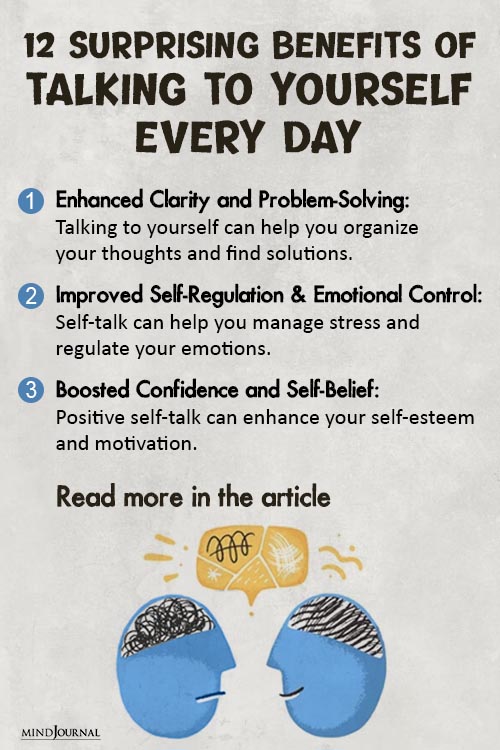Ever talked to yourself? Ever told yourself whether you are right or wrong? Ever gave yourself some much-needed advice? Of course, you have. Most of us talk to ourselves as self-talk is one of the best ways to reflect and gain clarity. But are there any benefits of talking to yourself?
Perhaps you’ve whispered words of encouragement before a big presentation or voiced out your thoughts while working through a challenging problem. It is always fun to talk to the most captivating person in the room – yourself!
You trust yourself, you always have your best interests at heart and you always keep your own secrets. Talking to yourself is undoubtedly the best conversation you will ever have. But is self-talk a bit weird? Or is it actually good for you?
Yes, it might seem a little odd, but trust me, talking to yourself is more common than you think. In fact, it’s a superpower we all possess, and it’s time we unleash its potential. Today, let us dive into the wonderful world of self-talk, exploring the types of self talk and the numerous benefits of talking to yourself.
So, get ready to embrace the chatter within and discover the magic of talking to yourself!
What Does Talking to Yourself Mean?
Before we dive into the benefits of talking to yourself, let’s break down what it actually means. The definition of talking to yourself, or self-talk, is very literal – having a conversation or discussion with your own self, whether silently or out loud.

It refers to the intentional or unintentional use of cue words in a systematic manner, in a silent or vocalized inner dialog with one’s self. According to a study, self-talk can be defined as “statements, phrases, or cue words that are addressed to the self which might be said automatically or strategically, either out loud or silently, phrased positively or negatively.”
Related: The Power Of Self-Talk
This process can have “an instructional or motivational purpose, an element of interpretation, and incorporating some of the same grammatical features associated with everyday speech,” adds the study.
It is our internal dialogue that occurs throughout the day and involves our thoughts, beliefs, ideas, and commentary about ourselves, our feelings, behaviors, actions, experiences, and our interactions with others. It serves as a means of self-reflection and self-expression. It is a way to connect with your inner self.
“The self talk we engage in may be overt or covert, and is associated with a variety of higher mental functions, including reasoning, problem solving, planning and plan execution, attention, and motivation,” explain researchers.
6 Major Types of Self Talk
So what type of self-talk do you engage in? Not sure about the different types of self talk we have with ourselves? Let’s find out then –
1. Positive Self-Talk
This is the uplifting and supportive type of self-talk. Positive self-talk involves using affirmations, encouraging statements, and constructive thoughts to uplift oneself.
By consciously replacing negative thoughts with positive ones, we can cultivate self-belief, motivation, and resilience. For instance, repeating phrases like “I can do this” or “I am capable” can boost confidence in challenging situations.

2. Instructional Self-Talk
Instructional self-talk involves talking oneself through a task or problem, providing guidance and direction. This type of self-talk helps improve focus, attention, and problem-solving abilities.
For example, when learning a new skill, you might say, “First, I need to gather the necessary materials, then follow the step-by-step instructions.”
3. Self-Compassionate Self-Talk
Self-compassionate self-talk involves offering kindness, understanding, and support to oneself during challenging times or moments of self-doubt. It helps us develop a nurturing and caring attitude towards ourselves, fostering self-acceptance and resilience.
For instance, saying, “It’s okay to make mistakes; I’m doing my best” can alleviate self-criticism and promote self-compassion.
4. Motivational Self-Talk
Motivational self-talk is all about pumping yourself up and getting into an energized state. It involves using enthusiastic and motivating language to push yourself beyond your limits, overcome obstacles, and achieve your goals.
It serves as an inner cheerleader, boosting motivation, focus, and determination. Motivational self-talk can help you tap into your inner drive, boost your performance, and maintain a positive attitude.
For example, saying, “Keep pushing; you’re almost there” during a workout can provide that extra burst of energy and drive.
Related: The 5 Types of Self-Talk Your Brain Likes Best
5. Neutral Self-Talk
Neutral self-talk is a more objective and matter-of-fact style of self-talk. It involves describing events, situations, or thoughts without attaching strong emotions or judgments. Neutral self-talk can help you maintain a balanced perspective and make rational decisions.
6. Negative Self-Talk
Negative self-talk involves critical, self-deprecating, or pessimistic thoughts and statements about oneself. This type of self-talk can be harmful and damaging to self-esteem and overall well-being.
Examples of negative self-talk include self-criticism, labeling oneself with negative attributes, and expecting the worst outcomes. It’s important to be aware of negative self-talk and work on replacing it with more positive and constructive self-talk patterns.

Remember, being aware of the different types of self talk is crucial for understanding the benefits of talking to yourself. While negative self-talk can be common, focusing on positive and constructive self-talk can help cultivate a healthier and more supportive inner dialogue.
12 Benefits of Talking to Yourself You Must Consider
Ever catch yourself talking to yourself? Turns out, it might be more beneficial than you think! Let’s dive into the surprising perks of self-talk.
1. Enhanced Clarity and Problem-Solving
Engaging in self-talk helps organize thoughts, articulate ideas, and gain clarity on complex matters. By verbalizing our thoughts, we can process information more effectively, identify potential solutions, and make well-informed decisions.
Self-talk acts as a sounding board, enabling us to explore different perspectives and analyze situations from a fresh angle.
2. Improved Self-Regulation and Emotional Control
Self-talk plays a pivotal role in regulating our emotions and managing stress. By acknowledging and verbalizing our feelings, we can better understand and control them.
For instance, saying, “Take a deep breath; you’ve got this” during a challenging situation can help calm nerves and promote emotional stability.
3. Boosted Confidence and Self-Belief
Positive self-talk fosters a sense of self-confidence and self-belief. By consciously replacing self-doubt with affirmations and constructive thoughts, we can overcome obstacles, embrace challenges, and develop a resilient mindset.
Positive self-talk empowers us to face adversity with optimism and belief in our abilities.
Related: The Inner Dialogue: How to Use Inner Conversations to Your Advantage
4. Heightened Focus and Concentration
When we talk ourselves through a task or problem, we enhance our focus and concentration. Verbalizing instructions or steps helps us stay engaged, avoid distractions, and complete tasks efficiently.
Instructional self-talk acts as an internal guide, keeping us on track and improving our overall performance.
5. Increased Self-Compassion and Well-Being
Self-compassionate self-talk promotes self-acceptance, reduces self-criticism, and enhances overall well-being. By offering ourselves kindness, understanding, and support, we cultivate a positive relationship with ourselves.
Self-compassion allows us to bounce back from setbacks, appreciate our strengths, and take care of our emotional needs. This is one of the primary benefits of talking to yourself.

6. Enhanced Memory and Learning
Engaging in self-talk during the learning process can significantly enhance memory retention and information recall. By expressing information verbally, we reinforce neural connections and improve our ability to remember and retrieve that information later.
Self-talk acts as an inner tutor, aiding in comprehension and long-term learning.
Self-talk serves as a therapeutic outlet for stress reduction and emotional release. Verbalizing our worries, fears, or frustrations can provide a sense of relief and catharsis.
By acknowledging and expressing our emotions, we can prevent them from bottling up and negatively impacting our well-being.
8. Improved Decision-Making
Self-talk aids in decision-making by allowing us to evaluate options, weigh pros and cons, and consider various factors. By engaging in a dialogue with ourselves, we can explore different perspectives, anticipate potential outcomes, and make more informed choices.
Self-talk enables us to tap into our intuition and inner wisdom, leading to better decision-making.
Related: How to Tame and Silence Your Inner Critic: 5 Ways
Want to know about some more amazing benefits of talking to yourself? Read on.
9. Enhanced Self-Awareness and Personal Growth
Talking to yourself promotes self-awareness and personal growth by facilitating introspection and self-reflection. Through self-talk, we can analyze our thoughts, behaviors, and motivations, gaining deeper insights into ourselves.
It helps us identify patterns, strengths, and areas for improvement, paving the way for personal development and growth.
10. Enhanced Creativity
Engaging in self-talk can boost your creative thinking. By verbalizing your ideas and thoughts, you stimulate different parts of your brain and encourage unique connections.
It allows you to explore new points of views, generate innovative solutions, and tap into your creative potential.
11. Strengthened Self-Identity
Self-talk plays a crucial role in shaping and reinforcing your self-identity. By engaging in positive and affirming conversations with yourself, you strengthen your self-image and foster a strong sense of identity.
It allows you to define who you are, embrace your values, and align your actions with your authentic self. So, talk kindly to yourself and watch your self-identity flourish.

12. Enhanced Mindfulness and Present Moment Awareness
Self-talk can serve as an anchor to the present moment. By verbalizing your thoughts and experiences, you bring yourself into the here and now. It helps you heighten your mindfulness, deepen your focus, and appreciate the richness of each moment.
So, talk yourself into the present and savor the beauty of the present moment.
Takeaway
Talking to yourself may seem unconventional, but it is a powerful tool for self-reflection, self-expression, and personal growth. From enhanced clarity and problem-solving to improved self-regulation and emotional control, the benefits of talking to yourself empower us to navigate life’s challenges with resilience and confidence.
So, the next time you find yourself engaged in a conversation with yourself, embrace it as a valuable practice that can positively transform your life. Embrace the power of self-talk and unlock its incredible potential for your well-being and personal development.
So, don’t hesitate to engage in positive, constructive, and uplifting self-conversations. You’ve got this!
Related: People Who Talk to Themselves Aren’t Crazy: They’re Genius!
Frequently Asked Questions (FAQs):
Why is it important to talk to yourself?
Talking to yourself is important for self-reflection, problem-solving, and self-soothing, helping to clarify thoughts and emotions.
Is it a good habit to talk to yourself?
Yes, talking to yourself can be a healthy habit, offering self-support, clarity, and stress relief in various situations.
How healthy is talking to yourself?
Talking to yourself can be healthy, aiding in self-expression, stress management, and cognitive function, promoting emotional well-being and clarity.











Leave a Reply